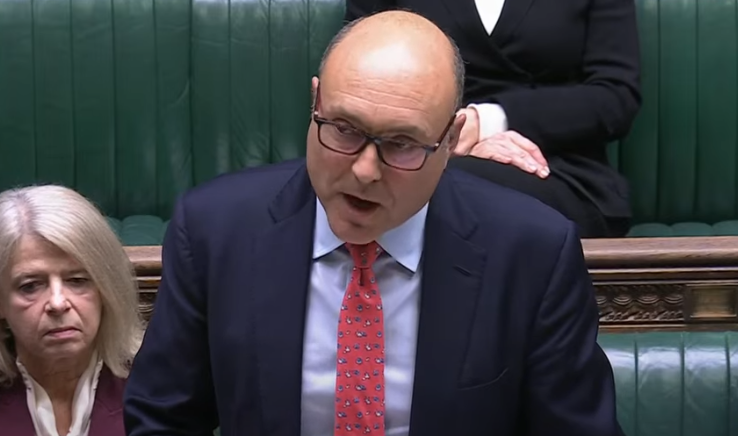Nigel Farage holding news conference after migration falls from record high
New immigration statistics show migration to the UK fell by 20%, but spending on asylum rose. Hot on the heels of the figures, Reform's Nigel Farage is holding a news conference with what he describes as "major announcements".

Former Tory minister Dame Andrea Jenkyns joins Reform UK
Nigel Farage has just announced that former government minister Dame Andrea Jenkyns is joining Reform UK.
She has been selected to stand as the party's candidate for the newly created post of Mayor of Greater Lincolnshire.
Dame Andrea was elected to parliament in 2015, famously defeating the sitting shadow chancellor Ed Balls to take his seat of Morley and Outwood.
She served as an education minister in the period after Boris Johnson resigned as the leadership contest was under way, and left government after the demise of the Truss government.
She lost her seat at the general election in July - despite famously having a photo of her with Mr Farage on her election leaflets.
Farage criticises Tories and Labour for 'horrendous' net migration figures
Reform UK leader Nigel Farage opens by criticising the "horrendous" figures on net migration to the UK.
Net migration to the UK fell by 20% in a year - from 906,000 in the year to June 2023 to 728,000 in the year to June 2024.
But he says those figures are still too high, and doesn't think the Tories will be "forgiven" in the coming years.
'My friend Elon'
He also criticises Labour for the news that the cost of the asylum system rose to £5.38bn - an increase of 36%, and that doesn't include the measures being taken in the English Channel to stop small boat crossings.
Mr Farage then criticises government policies on the winter fuel allowance and inheritance tax, before boasting about his TikTok page and relationships with Donald Trump and "new friend" Elon Musk.
Reform UK now has 'in excess of 100,000 members', party chair says
The chairman of Reform UK, Zia Yusuf, speaks first at the party's news conference.
He announces Reform has reached "in excess of 100,000 fully paid-up members" - up from 15,000 a year ago.
By comparison, there were thought to be around 132,000 Tory members eligible to vote in the party's leadership election earlier this month - a significant drop on previous contests.
Reform wants cuts to migration and taxes
Mr Yusuf went on to say Britons "see in Reform the only party that is willing to stand up for British people, defend and celebrate British values, and never compromise on the principle that the interests of the British people come first".
That means "ending the population explosion", and also through measures like cutting taxes.
He blames the Tories for the rapid increase in net migration, and claims it will accelerate under Labour.
'Tories totally lost control of immigration'
We just heard from the migration and citizenship minister, Seema Malhotra, about the 20% drop in net migration in the year to June 2024 (before Labour took office).
She said the figures show "the Tories totally lost control of our immigration system", noting net migration in the year to June 2023 hit nearly a million arrivals.
"We absolutely believe that net migration has to come down," she said. "But in order to do that, we need to go further.
"That's why we believe that you need to tackle the causes of net migration," she said, reiterating the government's plan to bring down the number of overseas workers we need.
But she won't give a number regarding what level migration should be reduced to.
Tories welcome net migration drop - but acknowledge 'mistakes of successive governments'
We've just had some reaction from the shadow home secretary, Chris Philp, to the data showing that while net migration has fallen by 20%, it still stood at an estimated 728,000 in the year to June 2024 (more here).
He's "glad" numbers have fallen from the record high of nearly a million the previous year, saying that is "thanks to some changes made by the previous Conservative government".
"But being truthful, these numbers are still far, far too high," he said, repeating the acknowledgement from Tory leader Kemi Badenoch yesterday that previous governments made "mistakes".
Reform only offer 'simplistic slogans'
He called for a "new approach" to immigration, with a "hard cap" on arrivals as part of an approach welcoming just a "limited number of high skill, high wage migrants".
Mr Philp went on to criticise Labour for scrapping the Rwanda scheme, and suspending some other visa restrictions that would reduce the number of family reunion visas.
He also criticised Reform UK, saying the party has "simplistic slogans" and is not "working on detailed plans".
Difficult questions for government on migration - as opponents likely to seize on high numbers
Net migration has fallen. That's not a surprise.
What was not expected was the actual figure: 728,000, the Office for National Statistics (ONS) estimate, in the year to June.
That number is high, not far off the peak two years ago, and nowhere near the half a million figure some had predicted.
The reason it counts as a significant fall is that the figure for the previous year has been revised up to 906,000 - a new record high.
The reasons, I am told, are firstly improvements in monitoring people transferring from one visa to another (adds 36,000 to immigration and takes 62,000 off emigration) and better monitoring of people coming from Ukraine (adds around 44,000 to immigration).
We may well be starting to see the impact of stricter rules on legal migration, for example the ban on care workers and students bringing dependents to the UK, and fewer people coming via humanitarian routes from Ukraine and Hong Kong, in the latest figures.
Farage will seize on headline figure
The expectation is that work and student visas numbers will fall in the coming years, and the ONS predicts overall net migration will fall to 300,000 in the next four years.
The headline figure today, however, is high and will likely be seized on by the likes of Nigel Farage.
Small boat crossings, which make up a fraction of the overall net migration figure, are up on last year.
Around 20,000 people have crossed the channel in small boats since Labour was elected, and Home Office data released today could paint a difficult picture on the asylum bill and hotel use.
Net migration may technically be down, but that doesn't mean there won't be difficult questions today for the government on migration.
Asylum applications hit highest level since 2022
As we at Sky News continue to analyse the vast trove of data the government has published in the last hour, we can bring you a bit more detail on claims for asylum.
The figures reveal that asylum applications in September hit 30,107 - the second-highest figure on record.
The record for the number of asylum applications was in September 2022 - and there were only 762 more in that month than in September this year.
Explore for yourself how the numbers of asylum claims have evolved since 2001.
This comes as updated government data reveals that spending on the asylum system reached the highest total since comparable records began.
Cleverly and Braverman take credit for drop in net migration
The former Conservative home secretary has put out a tweet claiming credit for the 20% fall in net migration to the UK (more on that here).
James Cleverly said: "Today's migration figures are the first to show the impact of the changes that I brought in as home secretary.
"Numbers are still too high, but we see the first significant downward trend in years. Changes that Labour opposed and haven't fully implemented."
The director of the Office for National Statistics backed up Mr Cleverly's claim of credit, saying the decrease in the number of people arriving for work-related reasons is "partly related to policy changes earlier this year".
His predecessor, Suella Braverman, also claimed credit, saying: "A 20% drop in immigration since June 2023 is a result of the changes I fought for and introduced in May 2023 as home secretary.
"That's when we started to turn the tide.
"But 1.2 million arrivals a year is still too high. This is unsustainable and why we need radical change."
Asylum spending hits highest level since comparable records began
Government spending on the asylum system reached the highest total since comparable records began, according to Home Office data.
In 2022/23, spending on asylum in the UK stood at £3.95bn.
A year later, in 2023/24, that rose to £5.38bn - an increase of 36%, and the highest total since comparable data began in 2010/11.
This number covers all Home Office costs related to asylum, including direct cash support and accommodation, plus wider staffing and other migration and borders activity.
However, it does not include any costs related to intercepting migrants in the English Channel travelling to the UK illegally.
To put the £5.38bn total for 2023/24 into some more context, it is:
- More than four times the equivalent figure for 2020/21 (£1.34bn);
- Nearly 12 times the total a decade ago in 2013/14 (£0.45bn).
Why has net migration fallen by 20%?
Net migration to the UK fell by 20% in a year - from 906,000 in the year to June 2023 to 728,000 in the year to June 2024.
The director of the Office for National Statistics, Mary Gregory, explained the rise in net migration - and why it has now fallen.
She said: "Since 2021, long-term international migration to the UK has been at unprecedented levels.
"This has been driven by a variety of factors, including the war in Ukraine and the effects of the post-Brexit immigration system. Pent-up demand for study-related immigration because of travel restrictions during the coronavirus pandemic also had an impact."
But while net migration remains "historically high", she went on to say that it is "beginning to fall".
In the 12 months to June 2024, Ms Gregory explained: "We have seen a fall in immigration, driven by declining numbers of dependants on study visas coming from outside the EU.
"Over the first six months of 2024, we are also seeing decreases in the number of people arriving for work-related reasons.
"This is partly related to policy changes earlier this year and is consistent with visa data published by Home Office."
She added that emigration (people leaving the UK) is starting to increase, particularly people who came on study-related visas.
"This is likely to be a consequence of the higher numbers of students coming to the UK post-pandemic who are now reaching the end of their courses," she explained.
These changes that Ms Gregory says led to the fall in net migration were brought in by the previous Conservative government.
Net migration down 20% from record high in 2023
Net migration to the UK stood at an estimated 728,000 in the year to June 2024, according to provisional data from the Office for National Statistics (ONS).
That is down 20% from a record 906,000 in the year to June 2023 (that figure has been revised upwards by 166,000 from the initial estimate of 740,000).
Net migration is calculated by subtracting the number of people who left the UK from the number of people who arrived to calculate the increase (or decrease) in arrivals.
In the 12 months to June 2024, some 1.2 million people are estimated to have arrived in the UK, while 479,000 are likely to have left.
This compares with 1.3 million who arrived in the UK in the year to June 2023 and 414,000 who left.
The drop in net migration took place after rule changes were implemented by the last Conservative government.
-SKY NEWS







